Hanoi’s ambitions to be a sustainable smart city
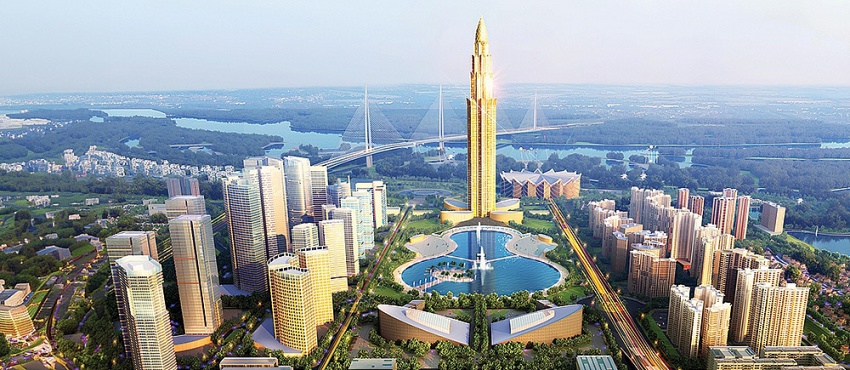 |
| The North Hanoi Smart City project has a total estimated investment of nearly $4.2 billion, spanning 270 hectares in Dong Anh district |
| Tran Sy Thanh, chairman, Hanoi People’s Committee The sustainable smart city model that Hanoi aims for will bring a quality, convenient, safe, and friendly living environment for all citizens. It will help build a government that serves the development of organisations and businesses with a dynamic economy, in which the digital economy accounts for an increasingly large proportion. The workforce has aspirations to rise, continuously innovate, and contribute to creating a prosperous society where all citizens live, learn, and work in a safe and happy environment. |
As voted by the International Institute for Management Development in collaboration with the World Smart Sustainable Cities Organization, the April list ranked Hanoi at 97th, rising three spots from 2023.
Researchers analysed data and surveyed 120 residents in each of the 142 cities worldwide to evaluate how the city's infrastructure and technology impacted overall performance and residents' quality of life.
To climb in the rankings, Hanoi has been implementing the construction of a model with the goal that by 2030, Hanoi will become a more modern city that can gradually connect to the smart city network in the wider region.
Ha Minh Hai, deputy chairman of the Hanoi People's Committee said, "The main goals of digital infrastructure, platforms, and data along with information security and service development are being synchronously implemented by Hanoi, ensuring effectiveness and practicality."
Particularly noteworthy, Hai added, is the city's leadership conducting fully digital signatures on the shared software system for city document management and operations. "All city government agencies have implemented digital signature documents; complete processing is done entirely online; and some shared database systems have been deployed over three levels to better serve internal operations and administrative procedures,” Hai said.
Moreover, the capital has developed the Hanoi-S application with many utilities to provide citizens and firms with access to the city's public administration agencies in a new way, changing the relationship between government agencies and citizens on a digital platform.
Some practical intra-city services have been directed to deploy to create optimal conditions for residents and businesses, such as completing the connection of electronic health records with the national population database. Over 1.5 million citizens have complete records on the city's electronic health record system, and all health facilities use citizen ID cards to retrieve insurance information. Over 14.4 million medical visits are also synchronised from exam and treatment management software to the city's e-record system.
In addition, Hanoi Parking Lot Management has deployed cashless parking services at points managed by the unit starting from last month. Moreover, the online public service providing judicial record certificates has been implemented through the VNeID application, also starting in April, with electronic result returns having legal validity just like paper copies.
At the end of 2023, North Hanoi Smart City Development Investment - a joint venture between BRG Group of Vietnam and Sumitomo Corporation of Japan, announced the implementation of the North Hanoi Smart City. Located in Dong Anh district, North Hanoi Smart City has a total planned investment of nearly $4.2 billion covering 272ha.
The complex will apply the essence of Industry 4.0 globally, aiming for a sustainable city model through green living and modern technology application. It will aim to boast smart energy, mobility, management, health, education, and economy.
Although initial results have been achieved, Hanoi's smart city construction is facing challenges such as dense population, infrastructure inadequacies, environmental pollution, and related water supply and drainage issues.
Nguyen Viet Hung, director of the Hanoi Department of Information and Communications pointed out that the key tasks and areas of focus in building a smart city include smart economic and social infrastructure such as health, culture, education, economy, industry, agriculture, tourism, and commerce.
"To lay the foundation for digital transformation, building a smart city needs to develop digital infrastructure, ensure information security, develop human resources, and strengthen cooperation domestically and internationally," Hung said.
Hai of Hanoi People's Committee added that the capital will focus on reviewing and identifying investment in physical infrastructure and IT equipment, while promoting technology support features for online public services.
"We will also improve and increase the number of administrative procedures provided in online form, especially focusing on ensuring the completion of the entire online public service target, maximising citizen costs when performing administrative transactions," Hai said.
Hanoi is also assigning authorised units to research support for free digital signatures for citizens when using online public services, and exempting or supporting a portion of charges for citizens using such services.
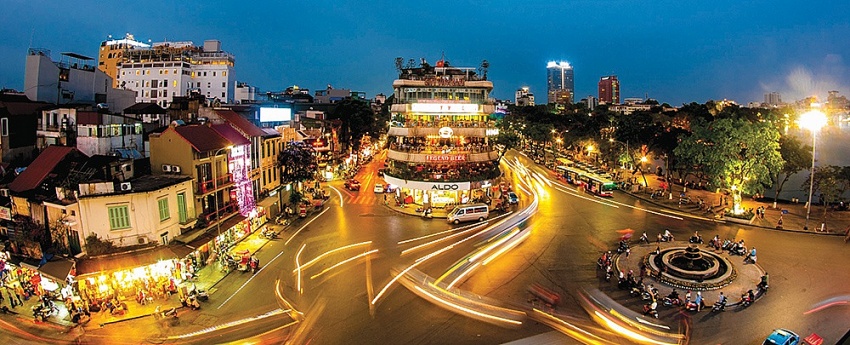 |
| Duong Viet Ha, officer, Hanoi Department of Finance
Having spent almost my entire life in Hanoi, I’ve witnessed first-hand the transformation towards becoming a smart city, and what stands out most is the city’s smart and efficient transportation system. The utilisation of technology to alleviate traffic congestion and enhance mobility for residents has truly revolutionised urban living. The integration of mobile applications providing real-time information on transportation options and public services has significantly elevated the city’s convenience and accessibility. To further elevate its standing in next year’s rankings, Hanoi must prioritise tackling its persistent traffic congestion. This entails strategic investments in infrastructure, including the construction of additional bridges, highways, and the enhancement of public transportation networks. By streamlining travel routes and reducing commute times, Hanoi can foster greater connectivity and efficiency throughout the city. Beyond the realm of smart city initiatives, I envision Hanoi evolving into a thriving hub of culture and the arts. Preserving and promoting its rich cultural heritage, such as the iconic Old Quarter and other historical landmarks, will be integral to cultivating a vibrant and diverse urban landscape. By fostering an environment that celebrates creativity and embraces cultural diversity, Hanoi can attract not only tourists but also nurture a sense of pride and belonging among its residents. Nguyen Tri Hieu, student, University of Nevada
One remarkable facet of a smart city is the adept utilisation of technology to bolster environmental stewardship. Presently, Hanoi’s implementation of an air quality monitoring system stands as a testament to this. Furnishing detailed pollution data and issuing alerts during periods of poor air quality, it raises awareness and encourages proactive participation in pollution mitigation efforts. To propel its digital transformation agenda forward, Hanoi must ramp up investments in IT infrastructure. This could entail the deployment of cutting-edge 5G networks and the development of innovative mobile applications, laying the groundwork for robust digital commerce and enticing foreign capital infusion into the city’s economy. Furthermore, I envision Hanoi’s growth not solely in economic terms but also in cultural and educational realms. A strategic focus on bolstering cultural and educational institutions, such as museums, libraries, and top-tier educational facilities, will foster a nurturing environment conducive to holistic development. By nurturing a thriving cultural scene and fostering a love for learning, Hanoi can cultivate a community of well-rounded individuals and ensure a sustainable and prosperous future for all its inhabitants. Xuan Mai, sales, Dai-ichi Life Vietnam
Hanoi has faced challenges such as environmental pollution, traffic congestion, and waste management. However, through the application of smart technology, the city has made significant strides in addressing these challenges and creating a more sustainable living environment. Hanoi being considered a smart city has a profound impact on the daily lives of residents and businesses. Smart solutions such as smart transportation systems and smart waste management not only make it easier and more time-saving for individuals and businesses to move around, but also create a clean and sustainable living environment. Traffic safety is enhanced, and the city’s competitiveness and economic development are also boosted through attracting investment and encouraging innovation in industries and services. Furthermore, improving the quality of public services such as healthcare, education, and administration is also crucial in enhancing the daily quality of life for residents and providing a more conducive environment for businesses to operate. To further develop Hanoi’s smart capabilities, we can leverage the experiences and successes of other smart cities worldwide. This can be achieved through building close cooperation with these cities to share experiences and learn effective methods, while also creating opportunities for collaboration in developing and implementing smart projects. Hanoi can also increase investment in research and development of smart technology, organise international events, and promote a learning and creative environment to encourage innovation and create new smart solutions for urban issues. Nguyen Van Minh, worker, Ajinomoto Factory in Thanh Hoa province
During my time travelling in Hanoi, I was very impressed by the development of modern public facilities such as free Wi-Fi and public mobile phone charging stations. This made me feel very convenient and comfortable while travelling in Hanoi. Additionally, I was also impressed by the VinBus electric bus system, which runs quite smoothly and also contributes to environmental protection. I visited Hanoi during a scorching hot day, and I believe that for Hanoi to develop towards a green urban direction, it needs to plant more trees. Planting more trees will create green public spaces where people can relax and enjoy nature. This not only makes the city more beautiful but also creates a positive and comfortable living environment for everyone. Apart from the criteria of a smart city, I would like to see Hanoi become a cultural city. Hanoi should maintain and promote its cultural and historical values, including preserving historical sites, cultural centres, and ethnic traditions. This will create a unique and diverse atmosphere for the city and attract tourists from all over the world. Some historical sites and cultural centres in Hanoi are no longer as attractive to tourists like me due to a lack of innovation in the tourism experience. For example, the Ho Chi Minh Mausoleum lacks integration with technology for tourists, and interactive activities are not effectively used to refresh the experience of tourists like me. Hien Anh, student, Academy of Journalism and Communications
Commuting via the elevated railway has helped me save costs and time getting to work. Additionally, Hanoi has numerous mobile applications for public services, such as apps which allow residents to check bus schedules and destinations, thus saving time and increasing convenience. However, Hanoi needs to heavily invest in digital infrastructure, including telecommunications networks and internet transmission systems, to establish a solid foundation for digital transformation. Improving this infrastructure will enhance connectivity and access to digital services for residents and businesses. From my experience, internet transmission during peak hours is often congested, causing inconvenience for users. Furthermore, to become a green city, Hanoi needs to enhance environmental management and protection, creating more green spaces. Measures to reduce pollution and create a healthy living environment for residents are necessary, as Hanoi is currently one of the most polluted cities in Southeast Asia. In addition to the criteria of a smart city, I would like to see Hanoi become a multidimensional city, where economic and technological development is carefully balanced with the preservation and promotion of cultural and historical values. Bui Quoc Anh, lecturer FPT University
To position itself as a frontrunner in the digital revolution, Hanoi must prioritise the development of a skilled workforce in IT and AI. Collaborative initiatives with universities and tech firms to offer specialised training programmes will ensure that the city is equipped with a talent pool capable of meeting the evolving demands of the digital economy. Hanoi boasts immense potential as a premier cultural tourism destination. By capitalising on its rich cultural heritage, the city can offer a plethora of unique tourism experiences, including guided historical site tours, vibrant cultural festivals, and immersive visits to traditional craft villages. These initiatives will undoubtedly attract tourists. Through strategic investments in tech and human capital, coupled with a concerted effort to preserve and promote its cultural heritage, Hanoi is poised to emerge as a beacon of innovation and vibrancy on the global stage. |
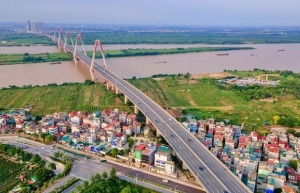 | Hanoi to establish third city comprising two districts The People's Committee of Hanoi has presented an adjusted planning scheme for the city's overall development until 2045, with a vision for 2065, foreseeing population growth reaching 12 million by 2030, 14.6 million by 2045 and 15.5 million by 2050. |
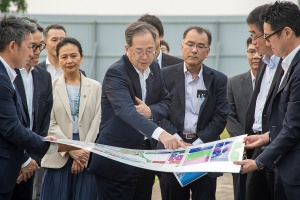 | Japanese leaders hold further talks to make North Hanoi Smart City a reality Japanese government agencies have held meetings with leaders of a consortium between Vietnam's BRG Group and Japan's Sumitomo Corporation to push progress on the North Hanoi Smart City project. |
 | Hanoi in the top 100 cities in the world 2024 The capital Hanoi ranked 96th and is the only representative in Vietnam mentioned in the World's Best Cities ranking. |
What the stars mean:
★ Poor ★ ★ Promising ★★★ Good ★★★★ Very good ★★★★★ Exceptional
Related Contents
Latest News
More News
- Dong Ho folk painting added to UNESCO’s urgent safeguarding list (December 11, 2025 | 18:09)
- Conference focuses on switch from dog and cat meat trade to sustainable, safe jobs (December 11, 2025 | 12:13)
- 3F Plus clean pork amazes Michelin-starred chefs (December 09, 2025 | 12:15)
- The Rhythm of Blues – Colours of the Year 2026 (December 06, 2025 | 12:10)
- Pan Pacific Hanoi kicks off 2026 art awards celebrating young and disabled artists (November 06, 2025 | 18:25)
- PREP AI Language Fair 2025 highlights AI-powered language learning (November 03, 2025 | 09:00)
- Hanoi strengthens rabies control and supports transition of dog and cat meat trade (October 28, 2025 | 18:09)
- World-famous Gaia Earth installation touches down at UNIS Hanoi (October 07, 2025 | 13:40)
- Sidecar passion drives Vietnamese motor enthusiasts wild (September 05, 2025 | 09:00)
- Sheraton Saigon unveils artistic mooncake collection for 2025 (August 08, 2025 | 09:00)




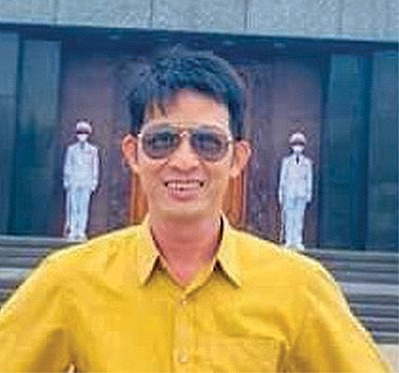


 Tag:
Tag:
![[Infographic] AMATA: Industrial and Smart City Developer](https://vir.com.vn/stores/news_dataimages/2026/022026/12/16/croped/amata-industrial-and-smart-city-developer-20260212165823.jpg?260212050401)



















 Mobile Version
Mobile Version